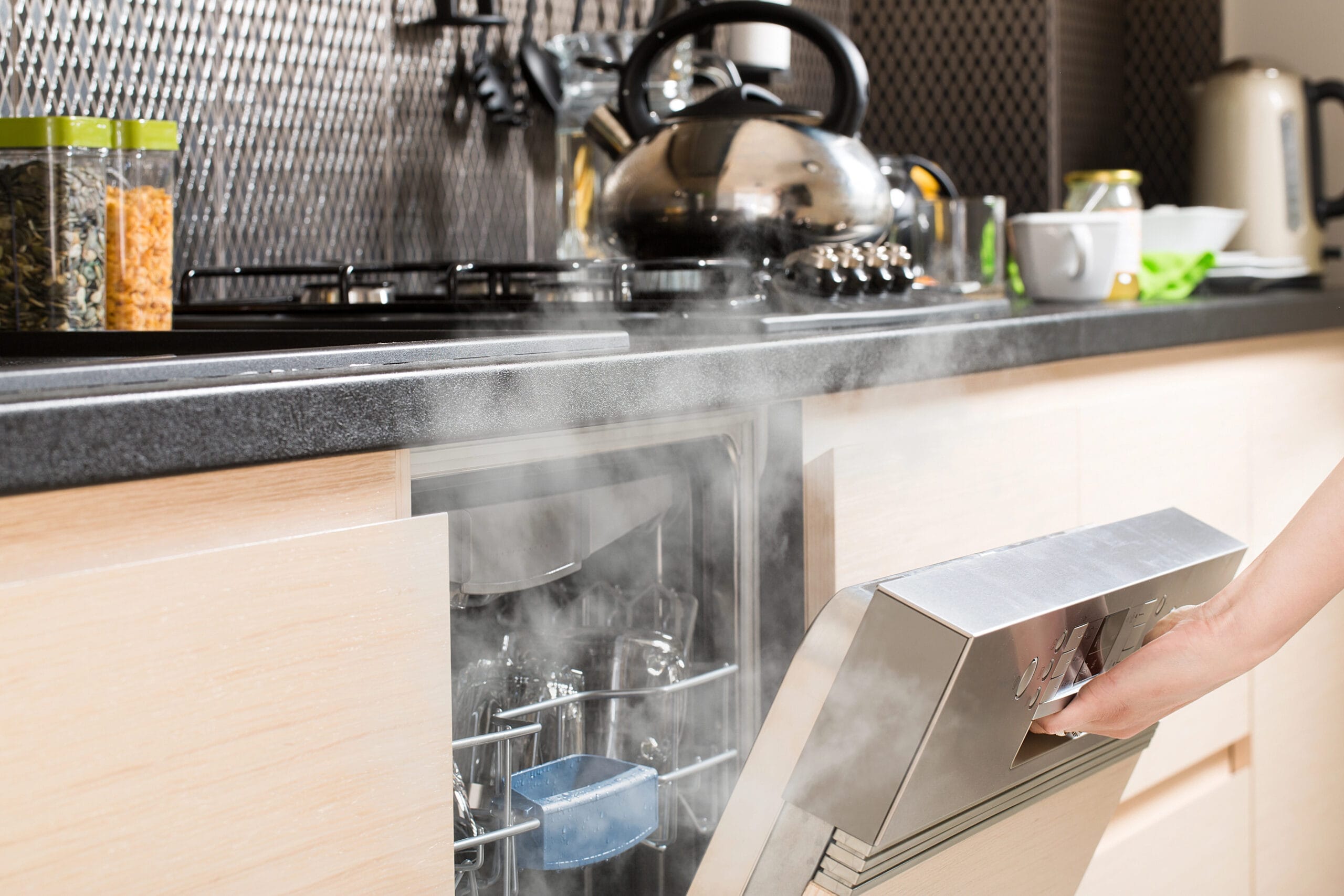Your dishwasher works hard day in and day out, so it’s no surprise it needs a little cleaning love to keep things running smoothly. Over time, food debris, grease, soap scum, and undissolved dishwasher detergent can build up in your appliance, and if ignored, it can lead to clogs, foul smells, and poor performance. If your dishes aren’t coming out perfectly clean, the culprit might be your dirty dishwasher.
Here’s how to clean your dishwasher step-by-step for optimal performance, without damaging your appliance or relying on harsh, abrasive cleaners:
How Often Should You Clean Your Dishwasher?
A clean dishwasher doesn’t just make your dishes sparkle; it protects your appliance’s lifespan and helps prevent major repairs down the road. As a general rule of thumb:
- Daily: Remove leftover food particles.
- Weekly: Wipe the door and clean the filter.
- Monthly: Deep clean the dishwasher interior.
Following this routine helps prevent buildup in stainless steel dishwashers, keeps your cycles efficient, and ensures you’re not dealing with undissolved detergent or a clogged filter down the line.
Clean Loose Food & Debris After Each Use
When your dishwasher finishes a cycle, take a quick peek inside. Remove any visible food debris from the bottom rack or drain area using a paper towel. Leftover food particles can clog the filter and reduce your dishwasher’s performance. For best results, scrape your dishes before loading, but there is no need to pre-rinse.
Wipe The Door & Gasket Weekly
Don’t forget the door! Particularly the edges and rubber seal, where grime loves to hide. Use a damp cloth or soft toothbrush dipped in warm water and a little dish soap to gently scrub away grease and buildup. Be cautious around the detergent dispenser. Residue can prevent it from opening properly during a wash cycle.
Clean The Dishwasher Filter Each Week
Your dishwasher filter traps food and debris during cycles. If it’s dirty, your appliance won’t work as efficiently. Remove the bottom rack and locate the filter (if you’re unsure where it is, check your owner’s manual). Rinse it under warm water and gently scrub with a soft toothbrush. Avoid abrasive cleaners that could damage the mesh.
Deep Cleaning The Dishwasher Interior
A thorough cleaning once a month makes a big difference in how well your dishwasher runs. It helps get rid of grease, food residue, and water minerals that accumulate on the dishwasher’s interior.
Remove Spray Arms & Filter
Take out the bottom rack, then remove the spray arms and filter. Check the spray arms for clogs. You can do this by using a toothpick or tweezers to dislodge any trapped food or undissolved detergent. Rinse all parts with warm water. These components are essential to proper water flow and cleaning power; keeping them clean helps your dishwasher perform at its best.
Run A High-Temperature Wash Cycle With White Vinegar
Place a dishwasher-safe cup filled with white vinegar on the top rack of your empty dishwasher. Run a hot water wash cycle. The vinegar breaks down grease, food grime, and water deposits while neutralizing odours.
This vinegar cycle is a great natural alternative to commercial products. A quick note is to make sure you just avoid using bleach, particularly if you have a stainless steel dishwasher.
Try A Cleaning Cycle With Dishwasher Cleaner
If your dishwasher still smells or looks grimy after the vinegar rinse, try running a second cleaning cycle using a commercial dishwasher cleaner. These products are designed to break down tough residue and work well on the interior walls, spray arms, and door gasket. Make sure to follow the product’s instructions for best results.
For extra freshness, sprinkle a cup of baking soda in the bottom of your empty dishwasher and run a short cycle. This step helps deodorize and adds a final polish to your deep cleaning routine.
Neglecting To Clean A Dishwasher Can Result In Major Problems
Think of your dishwasher like a sink. It needs regular cleaning to function properly! Skipping maintenance can lead to:
- Clogged spray arms
- A dirty dishwasher filter
- Standing water and drainage issues
- Residue buildup on dishes
- Reduced heating efficiency during wash cycles
- Foul odours from trapped food and grease
Regular cleaning is about hygiene, performance, and longevity. With a little effort, you can prevent most problems before they start.
Wrap-Up: Keep It Clean, Keep It Running
No matter if you and your family use your dishwasher once a day or a few times a week, remember that a consistent cleaning routine is crucial to getting the most out of your appliance.
If your dishwasher isn’t cleaning properly (even after deep cleaning) or you notice recurring issues with water drainage or spray arms, it might be time for professional help. At Mike’s Quality Appliance Repair, we specialize in expert dishwasher repair in Winnipeg and surrounding areas. If you’re dealing with a blocked filter, faulty pump, spray arm malfunction, or something else, we’ll diagnose and fix the problem quickly, so you can get back to clean dishes and a well-oiled kitchen routine.

